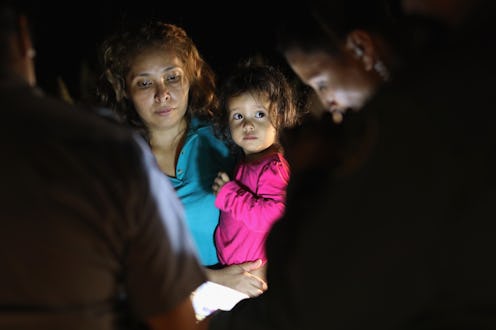News
7 Myths About Family Separation At The Border, Debunked

Deflect, defend, distort: This has been President Trump's response thus far to harsh criticisms of his "zero tolerance" approach to immigration. People have perpetuated numerous myths about Trump's family separation policy since reports surfaced that nearly 2,000 migrant children were separated from their parents over the last six weeks. To fully understand what's happening at the border, it's important to clean up the misinformation.
"The situation at our Southwest Border is unacceptable," Attorney General Jeff Sessions wrote in an April memo to U.S. attorney’s offices. The same memo asserted that anyone “illegally entering this country will not be rewarded, but will instead be met with the full prosecutorial powers of the Department of Justice.”
Since then, the administration has ramped up its "zero tolerance" policy, mandating that anyone caught illegally crossing the border will be criminally prosecuted. While parents await trial in jail, their children are taken to separate government facilities, with no idea when they'll see their families again. In an audio recording of children who have been separated from their parents obtained that ProPublica obtained from inside a U.S. Customs and Border Protection facility, children are heard sobbing and asking to go with family members.
Yet several of the explanations the Trump administration and conservative pundits alike have given for why these children were separated from their parents are based on complete falsehoods.
Separating Families At The Border Is Required By Law
President Trump, Attorney General Jeff Sessions, and the director of U.S. Immigration and Customs Enforcement (ICE) have all claimed in recent days that separating families caught illegally crossing the U.S. border is mandated by law. There is actually no law that requires this, however.
The separation policy came out of Trump's "zero tolerance" immigration plan that requires anyone found illegally entering the U.S. to be criminally prosecuted. Because children can't stay with their parents in jail, they're taken to separate facilities.
Crossing The Border Illegally Is A Felony
In reality, illegally crossing the U.S. border is a misdemeanor for first-time offenders. It becomes a felony when the person caught crossing the border illegally also has previously been deported.
“Thousands” Of Immigration Judges Are Processing Detained Migrants
President Trump claimed in May that the country has "thousands" of immigration judges, and called for thousands more to help address the backlog of cases plaguing immigration courts. The United States actually has fewer than 400 federal immigration judges.
Trump's "zero tolerance" policy has further overwhelmed the courts, as people who would have previously been deported without a criminal hearing now must face prosecution. One courthouse in McAllen, Texas recently began sentencing 85 immigrants at a time, twice a day, The Atlantic reports.
Children Are Only Separated From Their Parents If They're Caught Illegally Entering The Country
The case of one Guatemalan woman seeking asylum who says her child was also taken away challenges another common claim from the Trump administration: that families are separated only when they illegally cross the border.
It's impossible to seek asylum until you reach a port of entry or are already in the country. International law mandates that the government allows migrants to claim asylum at the border, so it's not illegal to do so. Eligible families are generally kept together while their request for asylum moves through the system.
But at least some of these families apparently are being separated now. The Guatemalan woman, who came to the country in May, sued the federal government this week for separating her and her 7-year-old son while she sought asylum.
Families Will Be Reunited Once A Parent Is Released From Custody
The Guatemalan woman suing the government was released from custody, but her lawsuit says that her son remains in a detention center.
Homeland Security Secretary Kirstjen Nielsen told reporters on Monday that a parent can ask the Department of Health and Human Services to release their child "back into their care" once they're released from jail. However, an ICE spokesperson told BuzzFeed News that most children won't be released to a parent "until the removal stage of the process" — in other words, until they're deported. There's also no evidence that the government has a plan for reuniting families, according to The New Yorker.
Past Administrations Separated Families, Too
Katie Waldman, a spokeswoman for Nielsen, claimed in an interview with The Washington Post that the Obama administration also separated families. Migrant children were detained under the Obama administration, but they were rarely separated from their families.
"There may have been some separation if there was suspicion that the children were being trafficked or a claimed parent-child relationship did not actually exist. But nothing like the levels we are seeing today," Sarah Pierce, a policy analyst at the Migration Policy Institute, told The Post.
Prior to the Trump administration, there was no policy requiring all illegal entry cases to be criminally prosecuted, thus causing the separation of all families caught crossing the border.
Child Detention Centers Are Just Like “Summer Camp"
The detention centers holding migrant children are "essentially summer camps," Fox News host Laura Ingraham suggested this week. An investigation by Reveal found that some migrant children are being sent to shelters with histories of abuse, however.
In fact, 44 percent of the $3.4 billion the federal government paid to private companies housing migrant children went to companies facing serious allegations of mistreatment between 2014 and 2018. "The sudden addition of thousands of children is straining these shelters, heightening the risk for neglect and abuse," the report from Reveal reads.
These are the facts: Separating children from their parents at the border is not a practice required by law. It is a policy created and enforced by the Trump administration — with no real plan in place for how to reunite those families down the road.